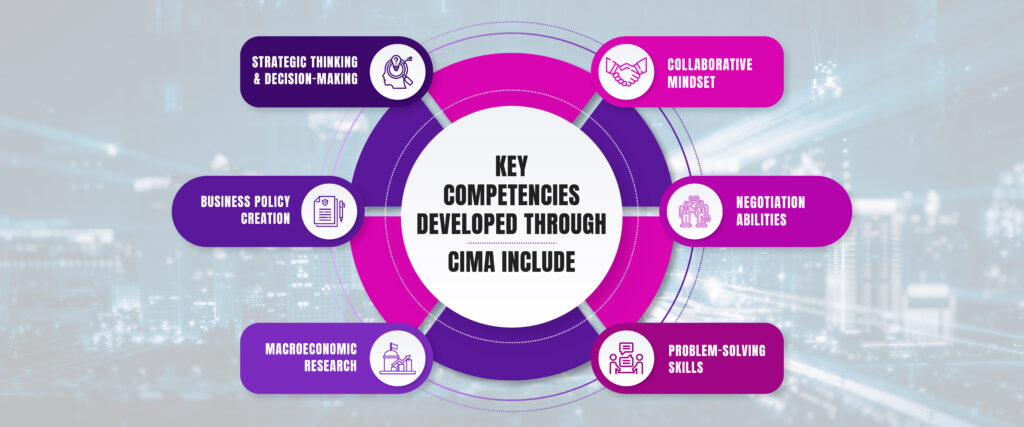

What Makes CIMA a Great Career Choice: Qualifications and Salary Expectations
In today’s fast-paced business world, many professionals aim to obtain their CIMA certification to improve their career prospects. The Chartered Institute of Management Accountants (CIMA) provides a respected credential that empowers individuals with the expertise needed to thrive in roles related to business strategy and finance. This certification is highly sought after due to its emphasis, on hands-on skills and its potential to unlock pathways in one’s career journey.
The certification, from the organization known as the Chartered Institute of Management Accountants (CIMA) is recognized for its in-depth curriculum that encompasses an array of topics within finance management and strategic planning in the business operations sphere. It aims to produce individuals of steer businesses toward success by making well-informed decisions and employing strategic thought processes. In our examination of the criteria and salary projections linked to obtaining a certification from the Chartered Institute of Management Accountants (CIMA), we will investigate the certification procedure itself along, with career opportunities and the monetary benefits that accompany achieving this esteemed accreditation.
Understanding CIMA Certification
What is CIMA?
The Chartered Institute of Management Accountants (CIMA) qualification is one of the most widely recognized qualifications for finance professionals. It aims to give people the skills and knowledge they need to excel in jobs beyond just accounting. CIMA certification opens doors to many high-level chances for accounting pros. With over 229,000 members in 176 countries, CIMA is one of the largest professional organizations for management accountants. This membership gives CIMA accountants extra credibility and pro-standing.
CIMA vs Traditional Accounting
Unlike other accounting certifications, CIMA takes a unique approach. It focuses on management accounting to meet internal company requirements. This program includes more than just basic bookkeeping. It teaches strategic business management techniques and delves into in-depth analysis and costing. People with CIMA qualifications can work as chartered accountants, handling money and number crunching. At the same time, they may act like MBA graduates, bringing the management expertise required to excel in corporate settings. CIMA is a desirable degree because it combines CA and MBA skills, preparing candidates for a variety of business positions.
Core Competencies
The CGMA Competency Framework, which supports the CIMA title, gives candidates five core skills: technical, business, people, leadership, and digital. This framework was made based on input from 700,000 change-makers and leaders making sure it’s relevant to today’s business world.
Key competencies developed through CIMA include:

The CIMA educational program its case studies, is designed to test students’ management and decision-making skills improving their leadership abilities. This approach helps bridge the skills gap for new finance pros making CIMA graduates valued by employers.
CIMA Qualification Journey
Eligibility Criteria
To qualify for the CIMA Professional Qualification, one must meet one of the following criteria:
Undergraduates/Class 12 Passouts doing graduation in Commerce:
Must appear for OCS, MCS, and SCS examinations while solving assignments for the rest of the papers.
Commerce Graduates:
Must appear for OCS, MCS, and SCS examinations while solving assignments for the rest of the papers.
Postgraduates/MBA Holders:
Must appear for MCS, and SCS examinations while solving the assignments for the rest of the papers in Management and Strategic level.
CA/CMA India Members (CIMA Accelerated Route)
Exemption in 15 subjects and appear only for Strategic Level – SCS exam.
Commerce Graduates with 6 + Yrs. Exp.:
Exemption in 14 subjects and this student has to appear for MCS and SCS exams and must solve the assignments for the rest of the paper.
C-suite Executives: 12+ Years Managerial Exp.
Exemption in 15 subjects, and the student has to appear only for the SCS exam.
Building a Successful Career with CIMA
In-Demand Skills
CIMA professionals have many skills that businesses value today. These include being good with digital tools thinking, and understanding business well. Digital skills can boost work output and help organizations succeed. Pros who keep up with tech trends in areas like cybersecurity robotic process automation (RPA), and data analysis gain an edge. Being creative and coming up with new ideas also helps careers grow. CIMA-qualified accountants turn their know-how into fresh solutions that help their companies and clients. The knack to think outside the box and innovate drives business growth and sparks new developments.
Job Roles for CIMA Professionals
CIMA certification leads to many career paths across different fields. Here are some jobs CIMA pros in India can do:
- Corporate Finance Manager
- Pricing Analyst
- Financial Reporting Manager
- Business Planning Manager
- Financial Analyst
- Financial Planning & Budgeting Manager
- Managing Directors and CEOs
CIMA pros can also become decision-makers at or near the director level taking part in talks about strategic change. They might work in main finance departments overseeing financial processes and procedures throughout the organization.
Industry Sectors
CIMA qualification is known worldwide letting pros work in various countries and industries. Here are some diverse fields where CIMA pros can find work:
- Professional services
- Public sector
- FMCG
- Retail
- Media
- Telecommunication & IT
- Transport, Travel, and Leisure
- Engineering, Manufacturing, and Exploration
Financial Rewards of CIMA Certification
Salary Trends
A CIMA certification has an influence on the financial rewards for folks in accounting and finance. Recent surveys show that CIMA-certified pros earn way more than those without the certification. In India, CIMA pros make about INR 26,00,000 a year on average. This beats what other accountants in India make, which is around INR 7.5 lakhs a year. In the UK, CIMA grads do even better. Certified members pocket more than double the average yearly national earnings, with a base pay of £60,000 plus a £7,200 bonus. New CIMA grads in London can expect to make about £50,000 to £55,000 a year.
Factors Affecting Earnings

Read More: ACCA vs. CIMA – Which Career Option to Choose From
Long-Term Financial Benefits
The CIMA certification has a big impact on long-term finances. As people move up in their jobs, they can earn much more. In the UK top jobs pay between £46,000 and £129,000. CIMA pros can also get the CGMA title, which boosts their pay even more. People with CGMA make twice the average pay starting around £54,000 and going up to £93,000 as they climb the ladder. Plus, CIMA certification gives job security and lets you work around the world opening doors to high-paying jobs everywhere. The wide range of skills you learn with CIMA, like running a business checking for risks, and giving money advice, makes you more valuable in lots of different fields.
The CIMA certification proves a key asset for pros who want to do well in finance and management. It gives people many skills, from thinking big to using tech, which makes them popular in many fields. The qualification focuses on real-world use, unlike old-school accounting certs getting pros ready to lead and make big choices. To those thinking about a career in finance and management, CIMA offers a good path with big rewards. Getting certified is tough, but it opens doors to high-paying jobs around the world, with CIMA pros earning more than most in their field. As firms keep valuing smart money management, the need for CIMA-qualified pros will go up making it a good bet to move up and secure your future money-wise.




